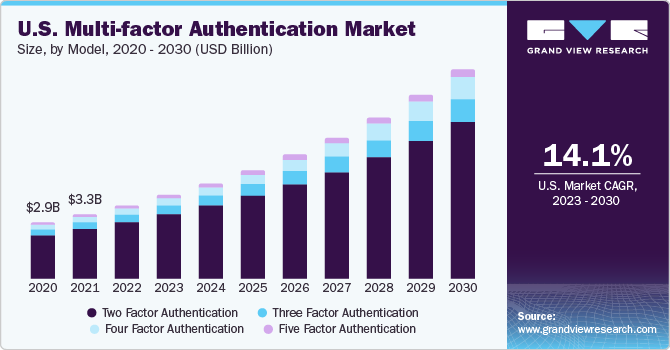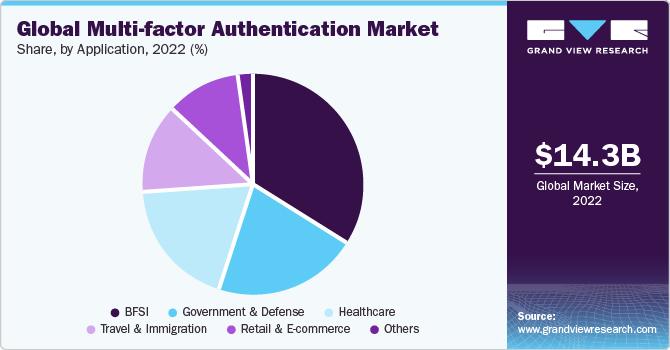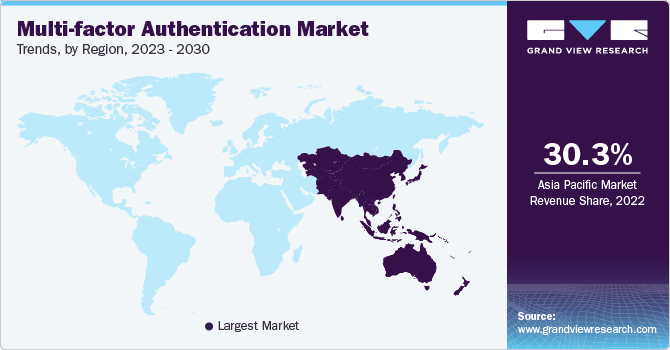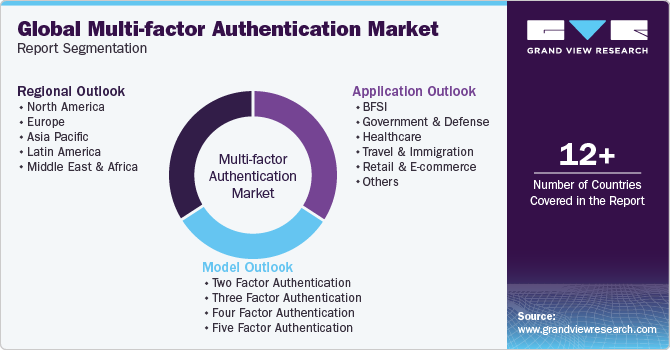- Home
- »
- Next Generation Technologies
- »
-
Multi-factor Authentication Market Size & Share Report, 2030GVR Report cover
![Multi-factor Authentication Market Size, Share & Trends Report]()
Multi-factor Authentication Market Size, Share & Trends Analysis Report By Model, By Application (BFSI, Healthcare, Government and Defense, Travel and Immigration, Retail), By Region, And Segment Forecasts, 2023 - 2030
- Report ID: GVR-2-68038-330-0
- Number of Report Pages: 98
- Format: PDF, Horizon Databook
- Historical Range: 2017 - 2021
- Forecast Period: 2023 - 2030
- Industry: Technology
Multi-factor Authentication Market Trends
The global multi-factor authentication market size was valued at USD 14.28 billion in 2022 and is expected to grow at a compound annual growth rate CAGR of 14.2% from 2023 to 2030. Multi-factor authentication (MFA) introduces additional layers of security to authenticate the user identity and secure transactions over the Internet. One of the key trends escalating market growth is the mounting cases of cyberattacks and data breaches across organizations. It coupled with increasing stringency in regulations to protect sensitive data, it is expected to bolster the growth of the MFA market.

Rising investments in cloud technologies, enterprise mobility, and increasing adoption of BYOD across enterprises are anticipated to boost the adoption of multi-factor authentication solutions further. The advent of authentication-as-a-service solutions, which offer advanced security and authentication to organizations, is also projected to bolster the market's growth.
Companies such as CA Technologies, Vasco Data Security International, Inc., RSA Security LLC, and Symantec Corporation are making significant R&D investments to develop new authentication products, solutions, and services.
Cost and implementation complexities will restrain the market; however, their impact will decrease with time. With the rise in data and security breaches, most industries have launched data security standards. To address security breaches and cyber-attacks, enterprises have adopted MFA solutions. These solution implementations are complex and, at the same time, require more capital investment for procurement, implementation, maintenance, and management. Heterogeneous IT environments across industries further increase the complexity.
The overall investment for implementing MFA is estimated to be high due to increased support services, training, SMS gateway, and hardware and software tokens. The requirement of additional drivers for physical authenticators and interoperability with varying IT environments increase the complexity of deployment. Hence, issues pertaining to the procurement cost and implementation complexity are poised to limit the widespread adoption of multi-factor authentication solutions.
Model Insights
The two-factor authentication segment accounted for the largest revenue share of 76.6% in 2022. This model enables organizations to authenticate the digital identities of users using multiple parameters such as knowledge-based, possession-based, and inherence-based factors.
The four-factor authentication segment is expected to grow at the fastest CAGR of 18.6% during the forecast period. Four-factor authentication offers an additional layer of security compared to traditional multifactor authentication methods. This comprehensive approach significantly enhances the security posture, making it harder for attackers to bypass authentication measures. Furthermore, regulatory compliance requirements in various industries, such as finance and healthcare, are driving the adoption of stricter authentication methods, including four-factor authentication, to meet stringent security standards and protect customer data.
Multifactor authentication technologies find application across several industry verticals as they offer enhanced security and data protection. Technology firms and service providers are innovating and deploying various solutions that deliver organizational operational efficiencies.
Application Insights
MFA enables secured access control, tracks fraudulent activities, and facilitates authentication of online transactions. The BFSI sector has witnessed the highest adoption of MFA solutions, which enable organizations to secure transactions and curb data loss and fraudulent activities.
The healthcare industry will likely be the fastest-growing segment during the forecast period, followed by the government and defense industry. Increasing online transactions, e-commerce, and the growing digitalization of financial and welfare services are key drivers leading to the high adoption of multifactor authentication solutions.

The BFSI segment held the largest revenue share of 33.7% in 2022 and is expected to witness the fastest CAGR of 15.6% over the forecast period. The BFSI sector handles a vast amount of sensitive financial data, making it an attractive target for cybercriminals. Financial institutions are increasingly adopting multifactor authentication as a critical security measure to mitigate the risk of data breaches to protect customer accounts, transactions, and personal information. Additionally, customer expectations for secure and seamless online banking experiences are rising, making it essential for BFSI organizations to implement robust authentication methods that balance security and user convenience.
The retail & e-commerce segment is expected to grow at a significant CAGR of 15.5% over the forecast period. As online shopping continues to gain popularity, the retail and e-commerce sector faces increasing cyberattack threats, such as payment fraud and identity theft. To combat these risks and build customer trust, retailers are adopting multifactor authentication as an effective security measure to protect sensitive customer data, including payment information and personal details. Additionally, consumers are becoming more conscious of security concerns when making online purchases, and they expect retailers to provide robust authentication solutions to safeguard their personal information.
Advancements in scanning technology, mobile authentication services, and biometric technologies have led to various innovative MFA solutions. Other verticals such as education, utilities, manufacturing, and logistics have discovered new ways to incorporate multifactor authentication technologies for securing access to corporate networks and safeguarding confidential data.
Regional Insights
Asia Pacific dominated the market and accounted for the largest revenue share of 30.3% in 2022, and it is expected to witness the fastest CAGR of 15.4% over the forecast period. The region's growth can be attributed to increasing spending on connected devices, growing investments in various cloud and IoT technologies, and spiraling demand for digital services. Soaring emphasis on the security of personal data and authentication of online transactions, coupled with increasingly stringent regulatory compliances, is stimulating the demand for MFA.

North America is expected to witness significant growth during the forecast period. Technological advancements, the proliferation of smartphones, enhanced network connectivity, and a high adoption rate of digital services are some of the key factors supplementing the regional market's growth. Moreover, growing cyber-attack cases are triggering the adoption of multi-factor authentication solutions in North America. The presence of major technology players such as CA Technologies, Symantec Corporation, Vasco Data Security International, Inc., and RSA Security LLC is anticipated to help the market in North America gain tremendous traction over the forecast period.
Key Companies & Market Share Insights
The key players in the industry are focusing on organic and inorganic growth strategies to maintain their market position. The industry players are undertaking strategies such as product launches, acquisitions, and collaborations to increase their global reach. For instance, in February 2023, Microsoft introduced a “Number Matching” feature in its Authenticator app to enhance security, particularly against MFA fatigue attacks. These attacks involve social engineering techniques employed by hackers to gain unauthorized access to an individual’s account. From May 2023 onwards, the company enabled this new feature for Microsoft Azure.
Key Multi-factor Authentication Companies:
- Vasco Data Security International, Inc.
- RSA Security LLC
- Fujitsu America, Inc.
- NEC Corporation
- Symantec Corporation
- Thales
- 3M
- aPersona, Inc.
- CA Technologies.
- Safran S.A.
Recent Developments
-
In April 2023, Thales, a leading global technology and security solutions provider, unveiled the SafeNet Token Fusion series. This innovative collection of USB tokens combines Fast IDentity Online 2.0 (FIDO2) with PKI/CBA, creating a single authenticator. The primary objective of Thales's new tokens was to safeguard Microsoft Azure Active Directory (Azure AD) users by mitigating the risk of account compromise by delivering enhanced security for accessing cloud and web applications.
-
In April 2022, Trust Stamp unveiled a Biometric Multi-Factor Authentication (Biometric MFA) solution. This innovative system revolutionizes identity verification by automating a strong level of assurance through a simple selfie. By leveraging biometric technology, the Biometric MFA adds two additional layers of authentication to verify the user's liveliness and secure tokenizing data from the selfie.
-
In March 2022, MIRACL, a cybersecurity software firm and Aware Inc., an authentication company, announced a strategic partnership to continue their cloud-based biometric authentication technology. The collaboration aims to address common challenges in business authentication by leveraging MIRACL's single-step, secure multi-factor authentication technology and Aware's recognized expertise in biometrics.
-
In May 2021, Microsoft announced the launch of new products, guidance, and employee plans to enhance security and provide enhanced customer support. Additionally, Microsoft revealed its commitment to adopting a zero-trust approach, ensuring that its employees embrace this security framework.
-
In April 2021, HID Global made its WorkforceID Authentication solution available to the public, offering enterprises a cloud-based platform for issuing, managing, and utilizing digital identity credentials for physical and logical access control. This solution enables organizations to streamline and enhance the security of user logins across all applications within their enterprise environment.
-
In July 2020, Ping Identity announced a collaboration with One Identity, a leading provider of security solutions centered around identity. This partnership aimed to deliver comprehensive identity management strategies and enhance access security and control. Both companies offered a powerful solution that covers consumers' end-to-end identity management needs by combining the capabilities of Ping Identity's access management technology with One Identity's Identity Governance and Administration (IGA) technology.
Multi-factor Authentication Market Report Scope
Report Attribute
Details
Market size value in 2023
USD 16.31 billion
Revenue forecast in 2030
USD 41.29 billion
Growth rate
CAGR of 14.2% from 2023 to 2030
Base year for estimation
2022
Historical data
2017 - 2021
Forecast period
2023 - 2030
Report updated
November 2023
Quantitative units
Revenue in USD million/billion, and CAGR from 2023 to 2030
Report coverage
Revenue forecast, company ranking, competitive landscape, growth factors, and trends
Segments covered
Model, application, region
Regional scope
North America; Europe; Asia Pacific; Latin America; and MEA
Country scope
U.S.; Canada; UK; Germany; France; China; Japan; India; Australia; South Korea; Brazil; Mexico; Saudi Arabia; South Africa; UAE
Key companies profiled
Vasco Data Security International, Inc.; RSA Security LLC; Fujitsu America, Inc.; NEC Corporation; Symantec Corporation; Thales; 3M; aPersona, Inc.; CA Technologies.; Safran S.A.
Customization scope
Free report customization (equivalent up to 8 analyst’s working days) with purchase. Addition or alteration to country, regional & segment scope
Pricing and purchase options
Avail customized purchase options to meet your exact research needs. Explore purchase options
Global Multi-factor Authentication Market Report Segmentation
This report forecasts revenue growth at global, regional, and country levels and provides an analysis of the latest industry trends in each of the sub-segments from 2017 to 2030. For this study, Grand View Research has segmented the global multi-factor authentication market report based on model, application, and region:

-
Model Outlook (Revenue, USD Million, 2017 - 2030)
-
Two Factor Authentication
-
Three Factor Authentication
-
Four Factor Authentication
-
Five Factor Authentication
-
-
Application Outlook (Revenue, USD Million, 2017 - 2030)
-
BFSI
-
Government & Defense
-
Healthcare
-
Travel & Immigration
-
Retail & E-commerce
-
Others
-
-
Regional Outlook (Revenue, USD Million, 2017 - 2030)
-
North America
-
U.S.
-
Canada
-
-
Europe
-
UK
-
Germany
-
France
-
-
Asia Pacific
-
China
-
Japan
-
India
-
Australia
-
South Korea
-
-
Latin America
-
Brazil
-
Mexico
-
-
Middle East and Africa
-
Saudi Arabia
-
South Africa
-
UAE
-
-
Frequently Asked Questions About This Report
b. The global multi-factor authentication market size was estimated at USD 14.28 billion in 2022 and is expected to reach USD 16.31 billion in 2023.
b. The global multi-factor authentication market is expected to grow at a compound annual growth rate of 14.2% from 2023 to 2030 to reach USD 41.29 billion by 2030.
b. Asia Pacific dominated the microwave devices market with a share of 30.3% in 2022. The growth of the region in the market can be attributed to increasing cybersecurity threats, regulatory complaints, improving digital infrastructure, and increased smartphone penetration, among others.
b. Some key players operating in the multi-factor authentication market include Vasco Data Security International, Inc., RSA Security LLC, Fujitsu America, Inc., NEC Corporation, Symantec Corporation, Thales, 3M, aPersona, Inc., CA Technologies., and Safran S.A.
b. Key factors that are driving the market growth include the mounting cases of cyber-attacks and data breaches across organizations coupled with increasing stringency in regulations to protect sensitive data, increased smartphone penetration, improving digital infrastructure, and rising cybersecurity concerns.
Share this report with your colleague or friend.
![gvr icn]()
NEED A CUSTOM REPORT?
We can customize every report - free of charge - including purchasing stand-alone sections or country-level reports, as well as offer affordable discounts for start-ups & universities. Contact us now
![Certified Icon]()
We are GDPR and CCPA compliant! Your transaction & personal information is safe and secure. For more details, please read our privacy policy.
We are committed towards customer satisfaction, and quality service.
"The quality of research they have done for us has been excellent."





